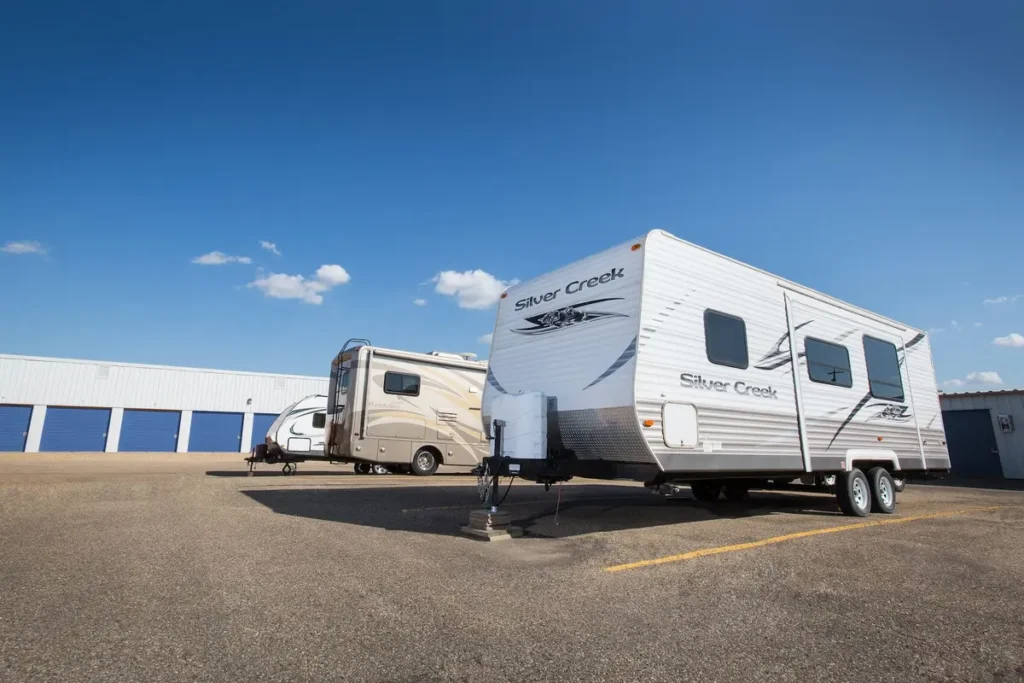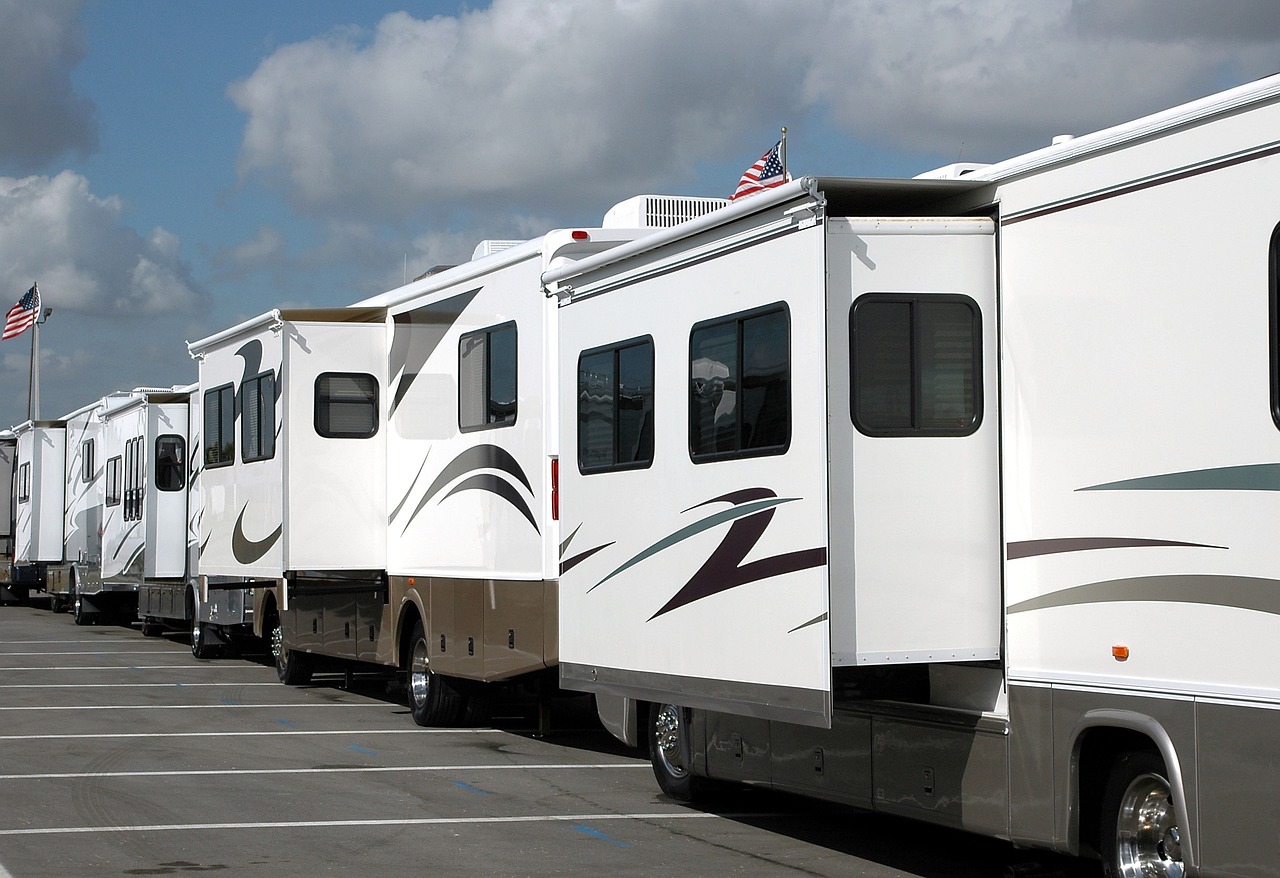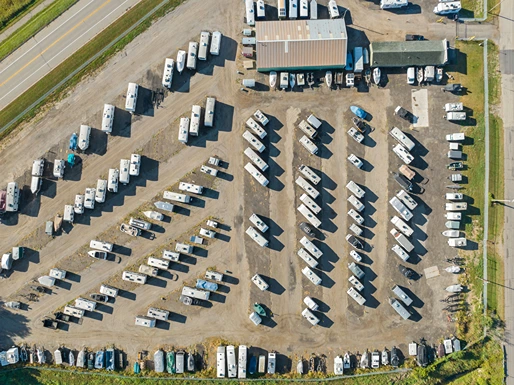Storing a motorhome takes preparation. With the right steps, you can help keep your RV in good condition, even during long periods of storage. This post will guide you through practical RV storage practices, ensuring your motorhome stays ready for future road trips.

Why RV Storage Matters
Motorhomes are valuable investments that need care when not in use. Proper RV storage can prevent wear and tear, reduce weather exposure, and help avoid costly repairs. Though no method guarantees absolute protection, following these steps can make a big difference in keeping your motorhome in great shape.
Prepping Your Motorhome for RV Storage
Before storing your RV, preparation is essential. These small steps may help avoid common issues like leaks or flat tires.
Clean the Interior and Exterior
Start with a thorough cleaning. Dirt, grime, and food residue can attract pests or cause long-term damage.
- Interior: Empty cabinets, wipe surfaces, and vacuum carpets. Remove perishables and unplug appliances to avoid smells.
- Exterior: Wash the exterior and apply a protective wax coat to reduce weather exposure. Check the roof and seals for cracks.
Taking time to clean your RV can make storage more manageable in the long run.
Inspect Tires and Adjust Pressure
Tires can lose pressure when sitting for long periods. This could lead to flat spots, especially if the RV isn’t moved.
- Inflate tires to their recommended PSI before storage.
- Park on level ground and use tire covers to block sunlight.
- If possible, move the RV every few weeks to prevent flat spots.
This preparation might help prolong tire life while your motorhome is stored.
Securing the Motorhome in RV Storage
Once your RV is ready, choosing a safe storage option becomes essential. A well-protected motorhome can stay in better condition until the next trip.
Choose a Safe Storage Location
Select a space that fits your needs. Outdoor storage works for some, but others prefer covered or indoor storage to reduce exposure to weather.
- Outdoor storage: More affordable but leaves the RV open to sun, rain, and snow.
- Covered storage: Offers some protection from elements without the cost of indoor storage.
- Indoor storage: The most protective option but often the most expensive.
Pick the solution that fits your budget and provides enough security for your RV.
Use Covers for Added Protection
Regardless of your storage type, covering your RV may provide added protection. A high-quality RV cover can help shield it from dirt, moisture, and UV rays.
- Use wheel covers to prevent tire cracks from sun exposure.
- Cover air vents and windows to keep insects and dust out.
- Consider breathable covers to prevent trapped moisture.
These covers may not prevent every issue, but they could reduce the risks.
Call us TODAY and learn more about the units we have available to secure your boat or RV in Mason City!
Protecting Your RV’s Systems During RV Storage
Extended storage can strain your motorhome’s systems. Preparing these components may help avoid repairs down the road.
Maintain the Battery
Batteries can drain over time, even when not in use. Taking steps to maintain battery life during storage is important.
- Disconnect the battery to avoid draining it.
- Use a battery maintainer or trickle charger to keep it topped off.
- Store the battery in a cool, dry place if possible.
This extra care might extend battery life and reduce replacement costs.
Manage the Fuel System
Fuel sitting too long can degrade. Taking some precautions may help keep the fuel system in better shape.
- Add a fuel stabilizer to prevent fuel breakdown.
- Fill the tank to minimize moisture buildup inside.
- Start the engine periodically to keep fuel moving through the system.
These steps may help avoid costly fuel system repairs when it’s time to hit the road again.
Keeping Pests Away During RV Storage
Motorhomes can attract unwanted visitors, like mice or insects, during storage. A few preventive measures may help keep pests at bay.
Seal Entry Points
Small gaps can let in pests. Check your RV for potential entry points and seal them.
- Inspect around doors, windows, and vents.
- Use steel wool or foam to block any small gaps.
- Place covers over exhaust pipes to prevent animals from nesting.
Though no method ensures complete protection, sealing openings can reduce the chance of infestations.

Place Pest Deterrents during RV Storage
Simple deterrents might help prevent pests from making your RV their home.
- Use mothballs or natural repellents near entry points.
- Place traps in common hiding spots.
- Clean the storage area to remove food sources.
Keeping pests out is easier than dealing with an infestation later.
Monitoring and Regular Checks During RV Storage
Regular check-ins during storage can help you catch problems early. A little attention may save time and money in the future.
Check on Your Motorhome
If possible, visit your RV every few weeks to make sure everything looks good.
- Check for tire pressure loss or fluid leaks.
- Open windows for ventilation to prevent mold buildup.
- Inspect for signs of pests or weather damage.
Periodic inspections can make it easier to spot issues before they get worse.
Keep a Maintenance Schedule
Creating a simple maintenance schedule might keep you on track.
- Set reminders to recharge batteries and check tire pressure.
- Make a list of routine tasks like starting the engine or running the generator.
- Use a checklist to ensure nothing is missed during your visits.
Following a schedule may make storing your motorhome less overwhelming.
Final Thoughts on RV Storage
While no storage method guarantees perfect protection, these best practices can help you care for your motorhome when it’s not in use. Cleaning your RV, choosing the right storage location, and maintaining essential systems can make a difference. Staying consistent with check-ins and pest control might also help prevent surprises down the road.
By preparing ahead and following these RV storage tips, your motorhome could be in better shape when it’s time to hit the road again.
Reach out to us HERE and explore your options. We have what you need in Mason City, Iowa!
Disclaimer:
The information provided is intended for educational purposes only and should not be taken as advice nor are there guarantees of any kind.


